University Contract Law Case Study: Max and Employment Scheme Dispute
VerifiedAdded on 2023/06/10
|9
|2224
|118
Case Study
AI Summary
This assignment presents a detailed analysis of a contract law case involving Max, an advertising executive, and Creative Advertising Ltd. The core issue revolves around an employment scheme offered to Max during pre-contractual negotiations, which was later disputed. The analysis examines the application of contract law principles, including oral contracts, the parole evidence rule, and misrepresentation under the Australian Consumer Law 2010 and the Fair Work Act 2009. The case explores whether Max has a right to the scheme benefits despite not fulfilling the two-year employment requirement, and whether the employer's misstatements and deceptive conduct impact the contract's validity. Key legal concepts such as promissory estoppel and the importance of written versus verbal agreements are discussed, with reference to relevant case law, including ACTV v Commonwealth, Peekay Intermark Ltd v Australia and New Zealand Banking Group Ltd, Curtis v Chemical Cleaning and Dyeing Co, and Australian Competition and Consumer Commission v TPG Internet Pty Ltd. The conclusion advises Max on his legal rights to claim benefits based on the initial offer and the company's misrepresentation.
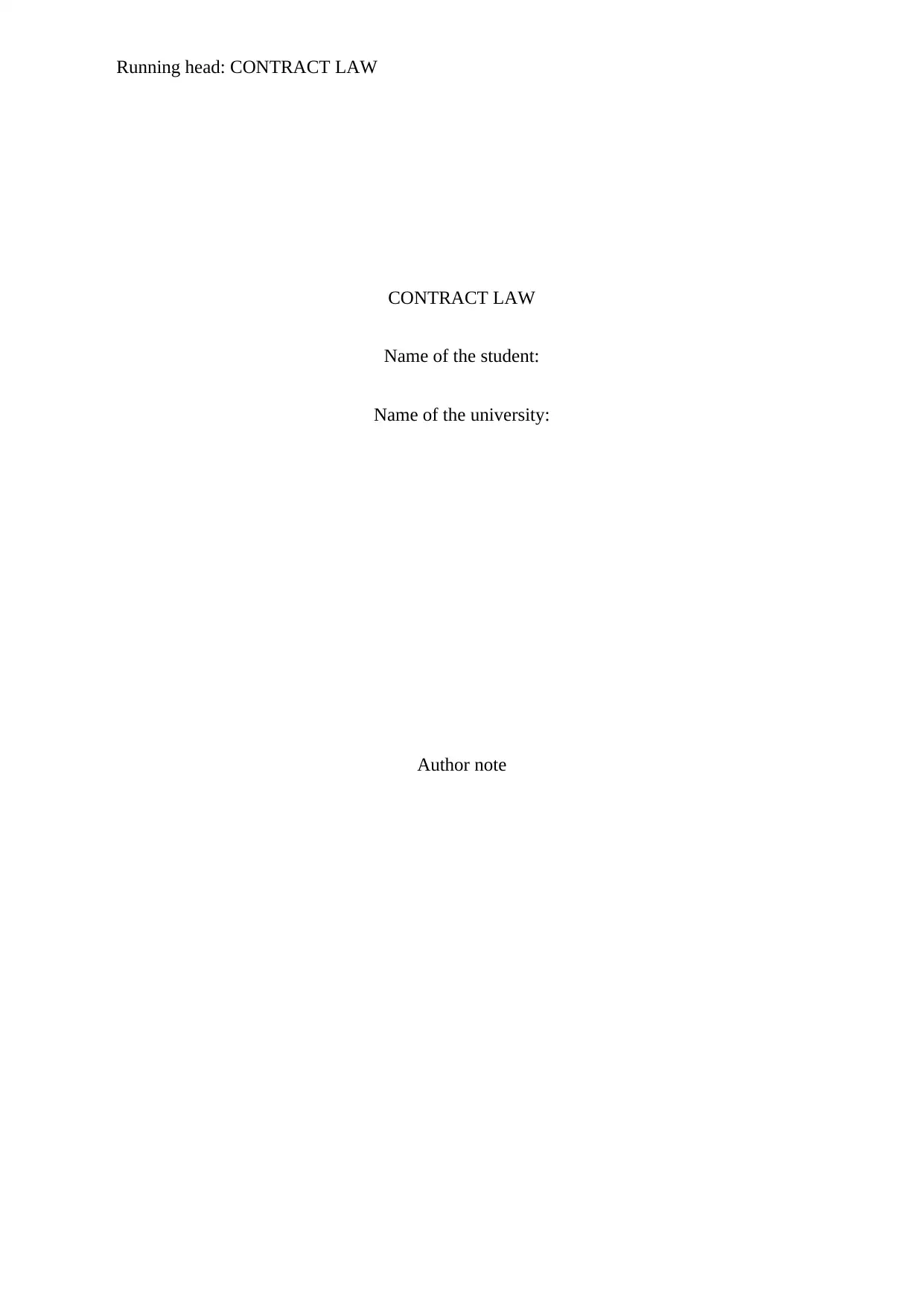
Running head: CONTRACT LAW
CONTRACT LAW
Name of the student:
Name of the university:
Author note
CONTRACT LAW
Name of the student:
Name of the university:
Author note
Paraphrase This Document
Need a fresh take? Get an instant paraphrase of this document with our AI Paraphraser
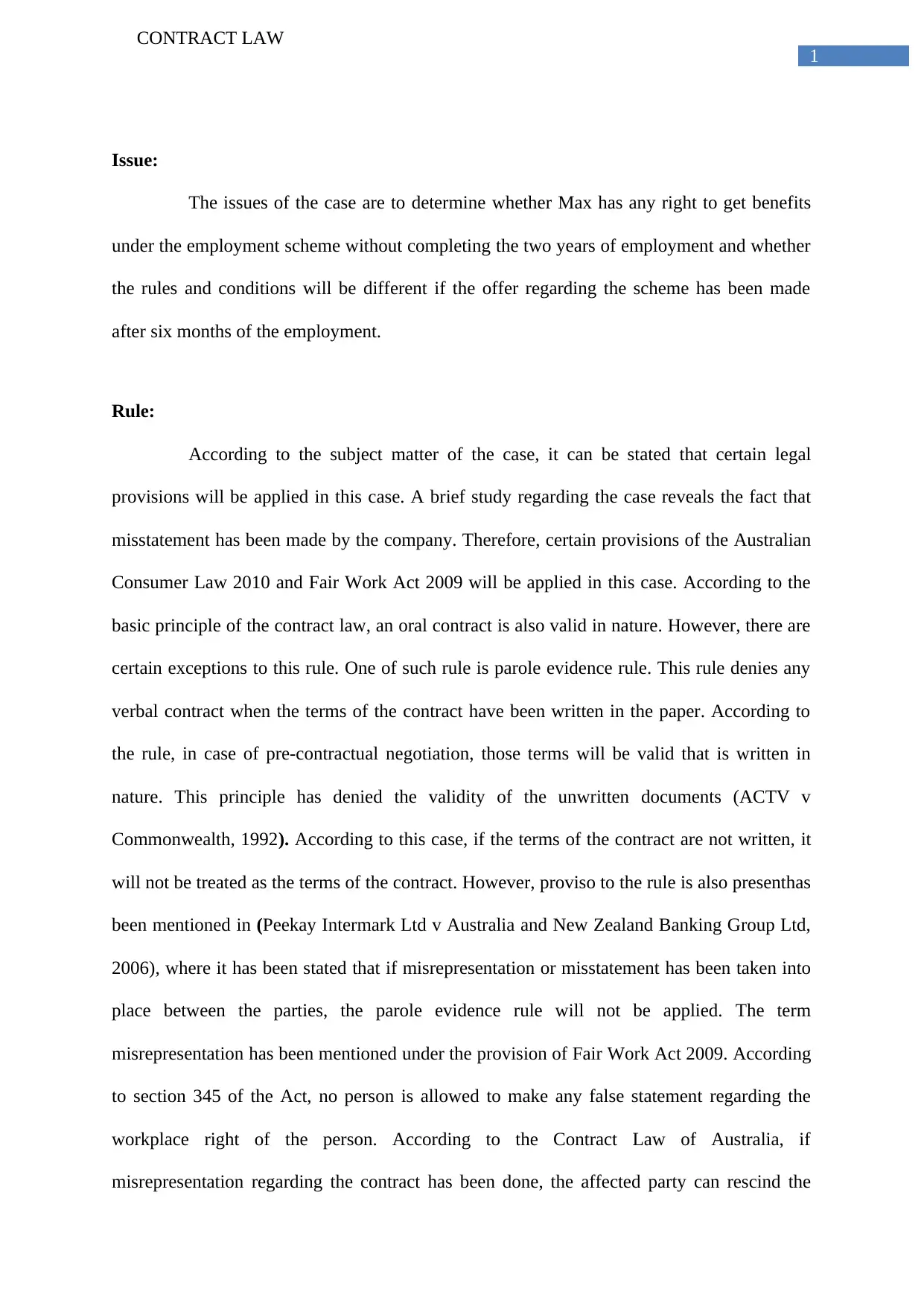
1
CONTRACT LAW
Issue:
The issues of the case are to determine whether Max has any right to get benefits
under the employment scheme without completing the two years of employment and whether
the rules and conditions will be different if the offer regarding the scheme has been made
after six months of the employment.
Rule:
According to the subject matter of the case, it can be stated that certain legal
provisions will be applied in this case. A brief study regarding the case reveals the fact that
misstatement has been made by the company. Therefore, certain provisions of the Australian
Consumer Law 2010 and Fair Work Act 2009 will be applied in this case. According to the
basic principle of the contract law, an oral contract is also valid in nature. However, there are
certain exceptions to this rule. One of such rule is parole evidence rule. This rule denies any
verbal contract when the terms of the contract have been written in the paper. According to
the rule, in case of pre-contractual negotiation, those terms will be valid that is written in
nature. This principle has denied the validity of the unwritten documents (ACTV v
Commonwealth, 1992). According to this case, if the terms of the contract are not written, it
will not be treated as the terms of the contract. However, proviso to the rule is also presenthas
been mentioned in (Peekay Intermark Ltd v Australia and New Zealand Banking Group Ltd,
2006), where it has been stated that if misrepresentation or misstatement has been taken into
place between the parties, the parole evidence rule will not be applied. The term
misrepresentation has been mentioned under the provision of Fair Work Act 2009. According
to section 345 of the Act, no person is allowed to make any false statement regarding the
workplace right of the person. According to the Contract Law of Australia, if
misrepresentation regarding the contract has been done, the affected party can rescind the
CONTRACT LAW
Issue:
The issues of the case are to determine whether Max has any right to get benefits
under the employment scheme without completing the two years of employment and whether
the rules and conditions will be different if the offer regarding the scheme has been made
after six months of the employment.
Rule:
According to the subject matter of the case, it can be stated that certain legal
provisions will be applied in this case. A brief study regarding the case reveals the fact that
misstatement has been made by the company. Therefore, certain provisions of the Australian
Consumer Law 2010 and Fair Work Act 2009 will be applied in this case. According to the
basic principle of the contract law, an oral contract is also valid in nature. However, there are
certain exceptions to this rule. One of such rule is parole evidence rule. This rule denies any
verbal contract when the terms of the contract have been written in the paper. According to
the rule, in case of pre-contractual negotiation, those terms will be valid that is written in
nature. This principle has denied the validity of the unwritten documents (ACTV v
Commonwealth, 1992). According to this case, if the terms of the contract are not written, it
will not be treated as the terms of the contract. However, proviso to the rule is also presenthas
been mentioned in (Peekay Intermark Ltd v Australia and New Zealand Banking Group Ltd,
2006), where it has been stated that if misrepresentation or misstatement has been taken into
place between the parties, the parole evidence rule will not be applied. The term
misrepresentation has been mentioned under the provision of Fair Work Act 2009. According
to section 345 of the Act, no person is allowed to make any false statement regarding the
workplace right of the person. According to the Contract Law of Australia, if
misrepresentation regarding the contract has been done, the affected party can rescind the
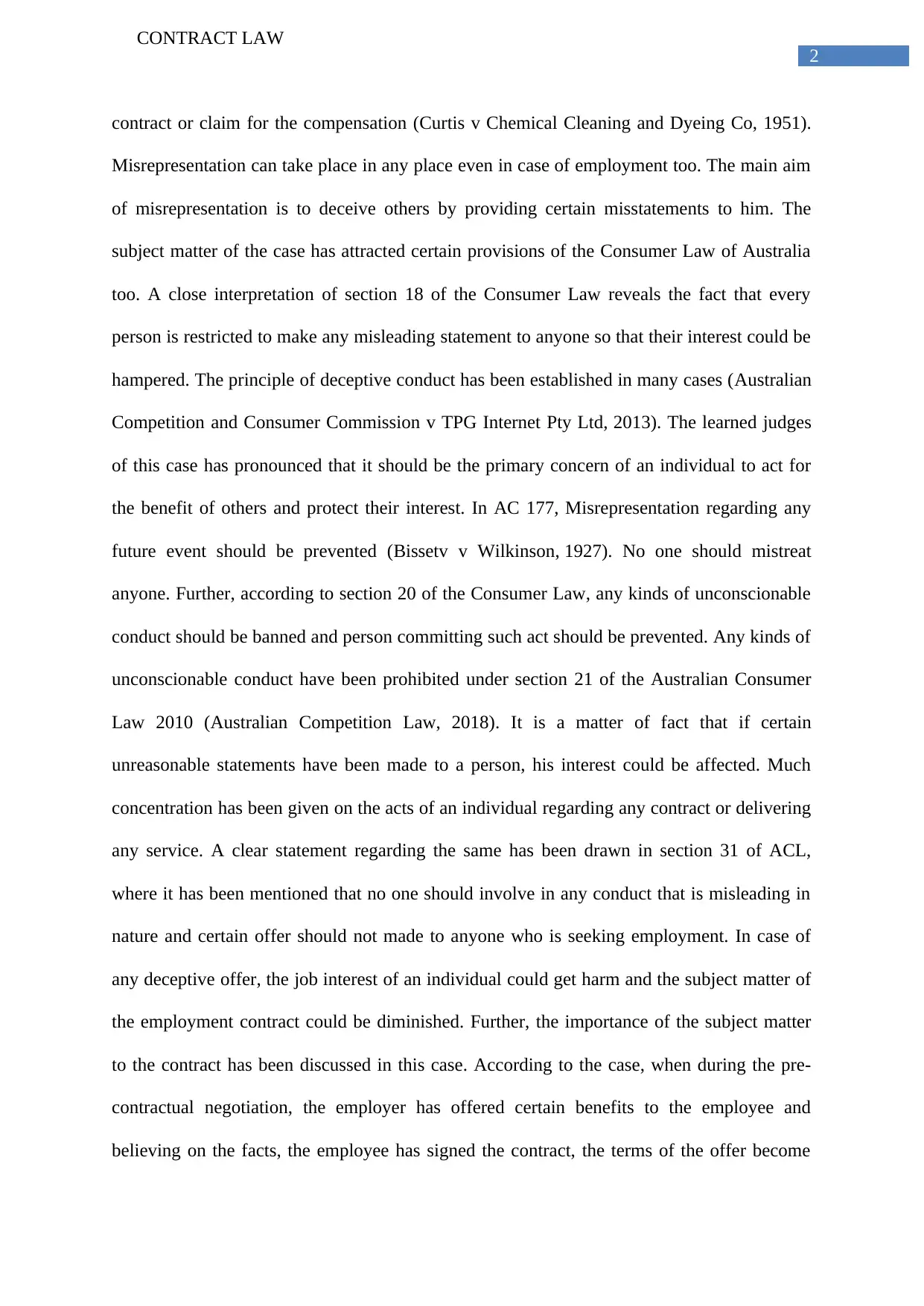
2
CONTRACT LAW
contract or claim for the compensation (Curtis v Chemical Cleaning and Dyeing Co, 1951).
Misrepresentation can take place in any place even in case of employment too. The main aim
of misrepresentation is to deceive others by providing certain misstatements to him. The
subject matter of the case has attracted certain provisions of the Consumer Law of Australia
too. A close interpretation of section 18 of the Consumer Law reveals the fact that every
person is restricted to make any misleading statement to anyone so that their interest could be
hampered. The principle of deceptive conduct has been established in many cases (Australian
Competition and Consumer Commission v TPG Internet Pty Ltd, 2013). The learned judges
of this case has pronounced that it should be the primary concern of an individual to act for
the benefit of others and protect their interest. In AC 177, Misrepresentation regarding any
future event should be prevented (Bissetv v Wilkinson, 1927). No one should mistreat
anyone. Further, according to section 20 of the Consumer Law, any kinds of unconscionable
conduct should be banned and person committing such act should be prevented. Any kinds of
unconscionable conduct have been prohibited under section 21 of the Australian Consumer
Law 2010 (Australian Competition Law, 2018). It is a matter of fact that if certain
unreasonable statements have been made to a person, his interest could be affected. Much
concentration has been given on the acts of an individual regarding any contract or delivering
any service. A clear statement regarding the same has been drawn in section 31 of ACL,
where it has been mentioned that no one should involve in any conduct that is misleading in
nature and certain offer should not made to anyone who is seeking employment. In case of
any deceptive offer, the job interest of an individual could get harm and the subject matter of
the employment contract could be diminished. Further, the importance of the subject matter
to the contract has been discussed in this case. According to the case, when during the pre-
contractual negotiation, the employer has offered certain benefits to the employee and
believing on the facts, the employee has signed the contract, the terms of the offer become
CONTRACT LAW
contract or claim for the compensation (Curtis v Chemical Cleaning and Dyeing Co, 1951).
Misrepresentation can take place in any place even in case of employment too. The main aim
of misrepresentation is to deceive others by providing certain misstatements to him. The
subject matter of the case has attracted certain provisions of the Consumer Law of Australia
too. A close interpretation of section 18 of the Consumer Law reveals the fact that every
person is restricted to make any misleading statement to anyone so that their interest could be
hampered. The principle of deceptive conduct has been established in many cases (Australian
Competition and Consumer Commission v TPG Internet Pty Ltd, 2013). The learned judges
of this case has pronounced that it should be the primary concern of an individual to act for
the benefit of others and protect their interest. In AC 177, Misrepresentation regarding any
future event should be prevented (Bissetv v Wilkinson, 1927). No one should mistreat
anyone. Further, according to section 20 of the Consumer Law, any kinds of unconscionable
conduct should be banned and person committing such act should be prevented. Any kinds of
unconscionable conduct have been prohibited under section 21 of the Australian Consumer
Law 2010 (Australian Competition Law, 2018). It is a matter of fact that if certain
unreasonable statements have been made to a person, his interest could be affected. Much
concentration has been given on the acts of an individual regarding any contract or delivering
any service. A clear statement regarding the same has been drawn in section 31 of ACL,
where it has been mentioned that no one should involve in any conduct that is misleading in
nature and certain offer should not made to anyone who is seeking employment. In case of
any deceptive offer, the job interest of an individual could get harm and the subject matter of
the employment contract could be diminished. Further, the importance of the subject matter
to the contract has been discussed in this case. According to the case, when during the pre-
contractual negotiation, the employer has offered certain benefits to the employee and
believing on the facts, the employee has signed the contract, the terms of the offer become
⊘ This is a preview!⊘
Do you want full access?
Subscribe today to unlock all pages.

Trusted by 1+ million students worldwide
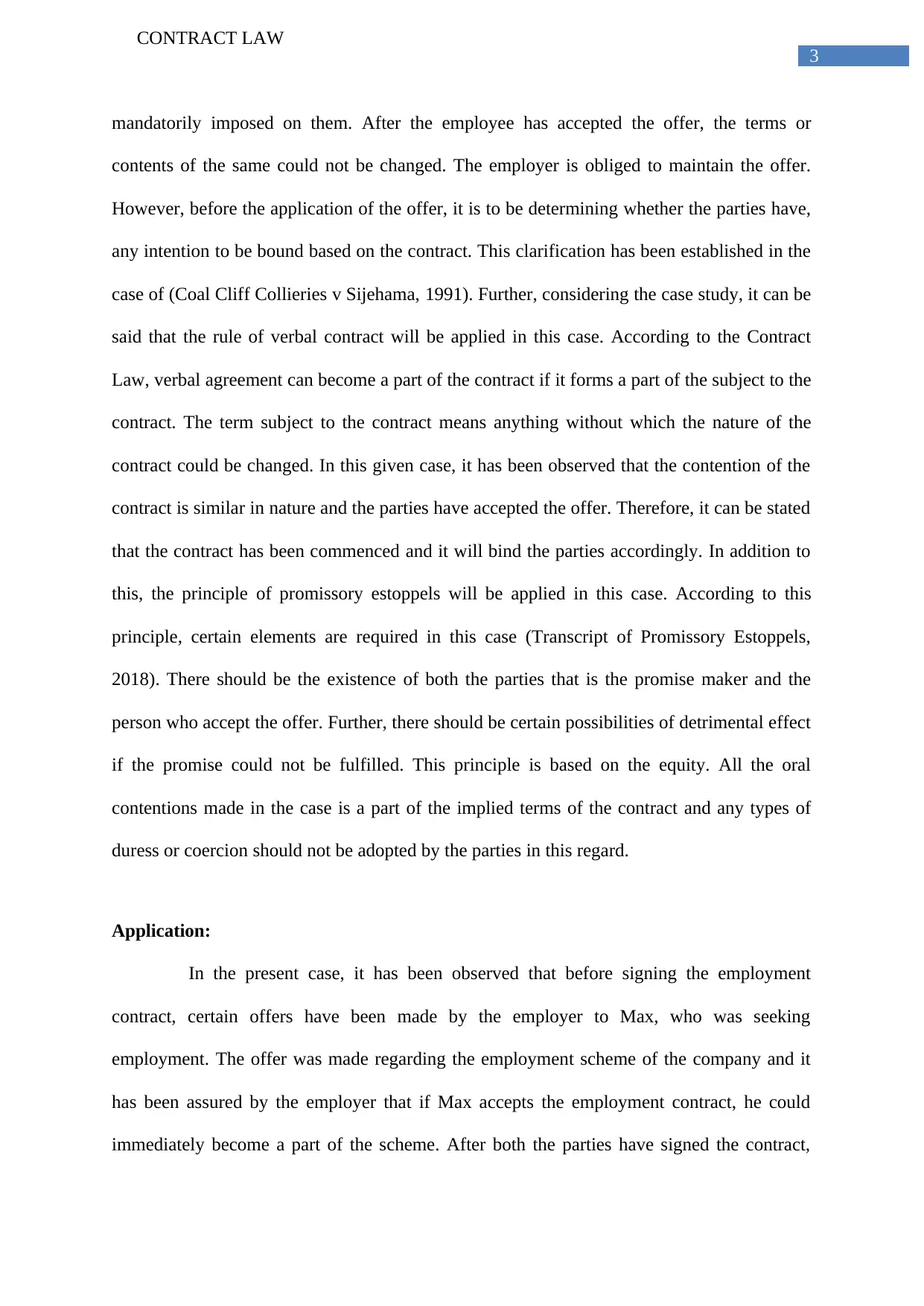
3
CONTRACT LAW
mandatorily imposed on them. After the employee has accepted the offer, the terms or
contents of the same could not be changed. The employer is obliged to maintain the offer.
However, before the application of the offer, it is to be determining whether the parties have,
any intention to be bound based on the contract. This clarification has been established in the
case of (Coal Cliff Collieries v Sijehama, 1991). Further, considering the case study, it can be
said that the rule of verbal contract will be applied in this case. According to the Contract
Law, verbal agreement can become a part of the contract if it forms a part of the subject to the
contract. The term subject to the contract means anything without which the nature of the
contract could be changed. In this given case, it has been observed that the contention of the
contract is similar in nature and the parties have accepted the offer. Therefore, it can be stated
that the contract has been commenced and it will bind the parties accordingly. In addition to
this, the principle of promissory estoppels will be applied in this case. According to this
principle, certain elements are required in this case (Transcript of Promissory Estoppels,
2018). There should be the existence of both the parties that is the promise maker and the
person who accept the offer. Further, there should be certain possibilities of detrimental effect
if the promise could not be fulfilled. This principle is based on the equity. All the oral
contentions made in the case is a part of the implied terms of the contract and any types of
duress or coercion should not be adopted by the parties in this regard.
Application:
In the present case, it has been observed that before signing the employment
contract, certain offers have been made by the employer to Max, who was seeking
employment. The offer was made regarding the employment scheme of the company and it
has been assured by the employer that if Max accepts the employment contract, he could
immediately become a part of the scheme. After both the parties have signed the contract,
CONTRACT LAW
mandatorily imposed on them. After the employee has accepted the offer, the terms or
contents of the same could not be changed. The employer is obliged to maintain the offer.
However, before the application of the offer, it is to be determining whether the parties have,
any intention to be bound based on the contract. This clarification has been established in the
case of (Coal Cliff Collieries v Sijehama, 1991). Further, considering the case study, it can be
said that the rule of verbal contract will be applied in this case. According to the Contract
Law, verbal agreement can become a part of the contract if it forms a part of the subject to the
contract. The term subject to the contract means anything without which the nature of the
contract could be changed. In this given case, it has been observed that the contention of the
contract is similar in nature and the parties have accepted the offer. Therefore, it can be stated
that the contract has been commenced and it will bind the parties accordingly. In addition to
this, the principle of promissory estoppels will be applied in this case. According to this
principle, certain elements are required in this case (Transcript of Promissory Estoppels,
2018). There should be the existence of both the parties that is the promise maker and the
person who accept the offer. Further, there should be certain possibilities of detrimental effect
if the promise could not be fulfilled. This principle is based on the equity. All the oral
contentions made in the case is a part of the implied terms of the contract and any types of
duress or coercion should not be adopted by the parties in this regard.
Application:
In the present case, it has been observed that before signing the employment
contract, certain offers have been made by the employer to Max, who was seeking
employment. The offer was made regarding the employment scheme of the company and it
has been assured by the employer that if Max accepts the employment contract, he could
immediately become a part of the scheme. After both the parties have signed the contract,
Paraphrase This Document
Need a fresh take? Get an instant paraphrase of this document with our AI Paraphraser
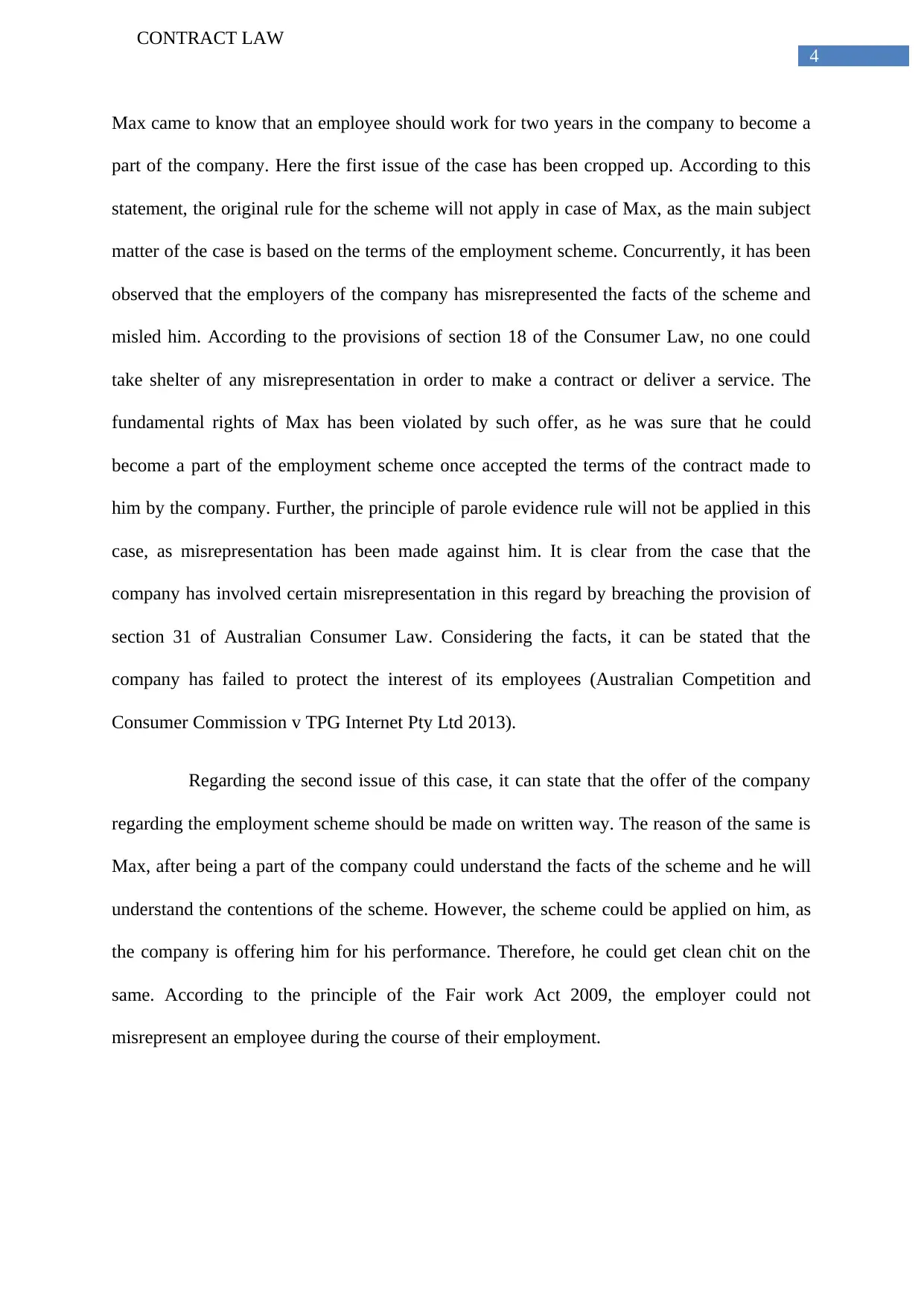
4
CONTRACT LAW
Max came to know that an employee should work for two years in the company to become a
part of the company. Here the first issue of the case has been cropped up. According to this
statement, the original rule for the scheme will not apply in case of Max, as the main subject
matter of the case is based on the terms of the employment scheme. Concurrently, it has been
observed that the employers of the company has misrepresented the facts of the scheme and
misled him. According to the provisions of section 18 of the Consumer Law, no one could
take shelter of any misrepresentation in order to make a contract or deliver a service. The
fundamental rights of Max has been violated by such offer, as he was sure that he could
become a part of the employment scheme once accepted the terms of the contract made to
him by the company. Further, the principle of parole evidence rule will not be applied in this
case, as misrepresentation has been made against him. It is clear from the case that the
company has involved certain misrepresentation in this regard by breaching the provision of
section 31 of Australian Consumer Law. Considering the facts, it can be stated that the
company has failed to protect the interest of its employees (Australian Competition and
Consumer Commission v TPG Internet Pty Ltd 2013).
Regarding the second issue of this case, it can state that the offer of the company
regarding the employment scheme should be made on written way. The reason of the same is
Max, after being a part of the company could understand the facts of the scheme and he will
understand the contentions of the scheme. However, the scheme could be applied on him, as
the company is offering him for his performance. Therefore, he could get clean chit on the
same. According to the principle of the Fair work Act 2009, the employer could not
misrepresent an employee during the course of their employment.
CONTRACT LAW
Max came to know that an employee should work for two years in the company to become a
part of the company. Here the first issue of the case has been cropped up. According to this
statement, the original rule for the scheme will not apply in case of Max, as the main subject
matter of the case is based on the terms of the employment scheme. Concurrently, it has been
observed that the employers of the company has misrepresented the facts of the scheme and
misled him. According to the provisions of section 18 of the Consumer Law, no one could
take shelter of any misrepresentation in order to make a contract or deliver a service. The
fundamental rights of Max has been violated by such offer, as he was sure that he could
become a part of the employment scheme once accepted the terms of the contract made to
him by the company. Further, the principle of parole evidence rule will not be applied in this
case, as misrepresentation has been made against him. It is clear from the case that the
company has involved certain misrepresentation in this regard by breaching the provision of
section 31 of Australian Consumer Law. Considering the facts, it can be stated that the
company has failed to protect the interest of its employees (Australian Competition and
Consumer Commission v TPG Internet Pty Ltd 2013).
Regarding the second issue of this case, it can state that the offer of the company
regarding the employment scheme should be made on written way. The reason of the same is
Max, after being a part of the company could understand the facts of the scheme and he will
understand the contentions of the scheme. However, the scheme could be applied on him, as
the company is offering him for his performance. Therefore, he could get clean chit on the
same. According to the principle of the Fair work Act 2009, the employer could not
misrepresent an employee during the course of their employment.
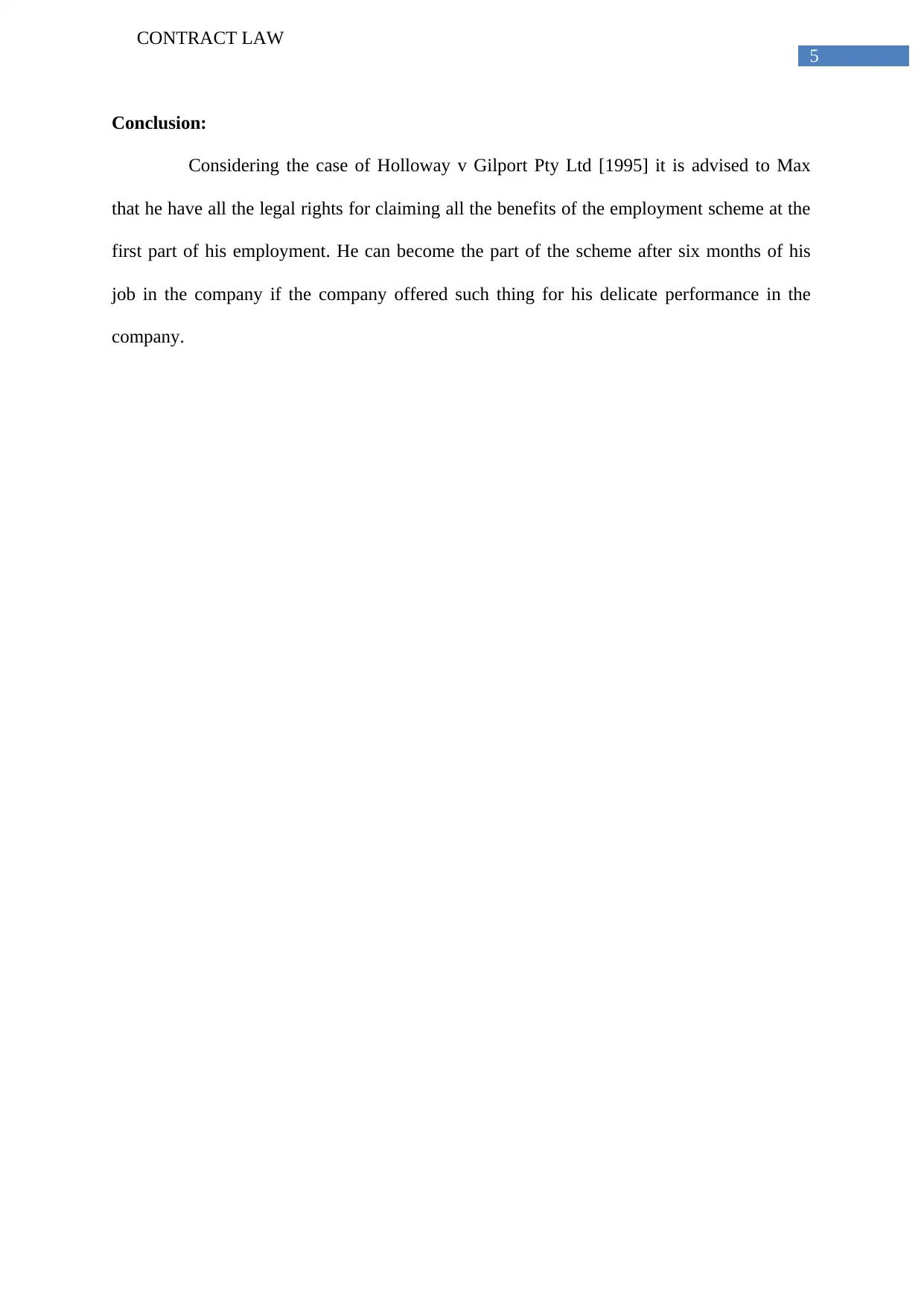
5
CONTRACT LAW
Conclusion:
Considering the case of Holloway v Gilport Pty Ltd [1995] it is advised to Max
that he have all the legal rights for claiming all the benefits of the employment scheme at the
first part of his employment. He can become the part of the scheme after six months of his
job in the company if the company offered such thing for his delicate performance in the
company.
CONTRACT LAW
Conclusion:
Considering the case of Holloway v Gilport Pty Ltd [1995] it is advised to Max
that he have all the legal rights for claiming all the benefits of the employment scheme at the
first part of his employment. He can become the part of the scheme after six months of his
job in the company if the company offered such thing for his delicate performance in the
company.
⊘ This is a preview!⊘
Do you want full access?
Subscribe today to unlock all pages.

Trusted by 1+ million students worldwide
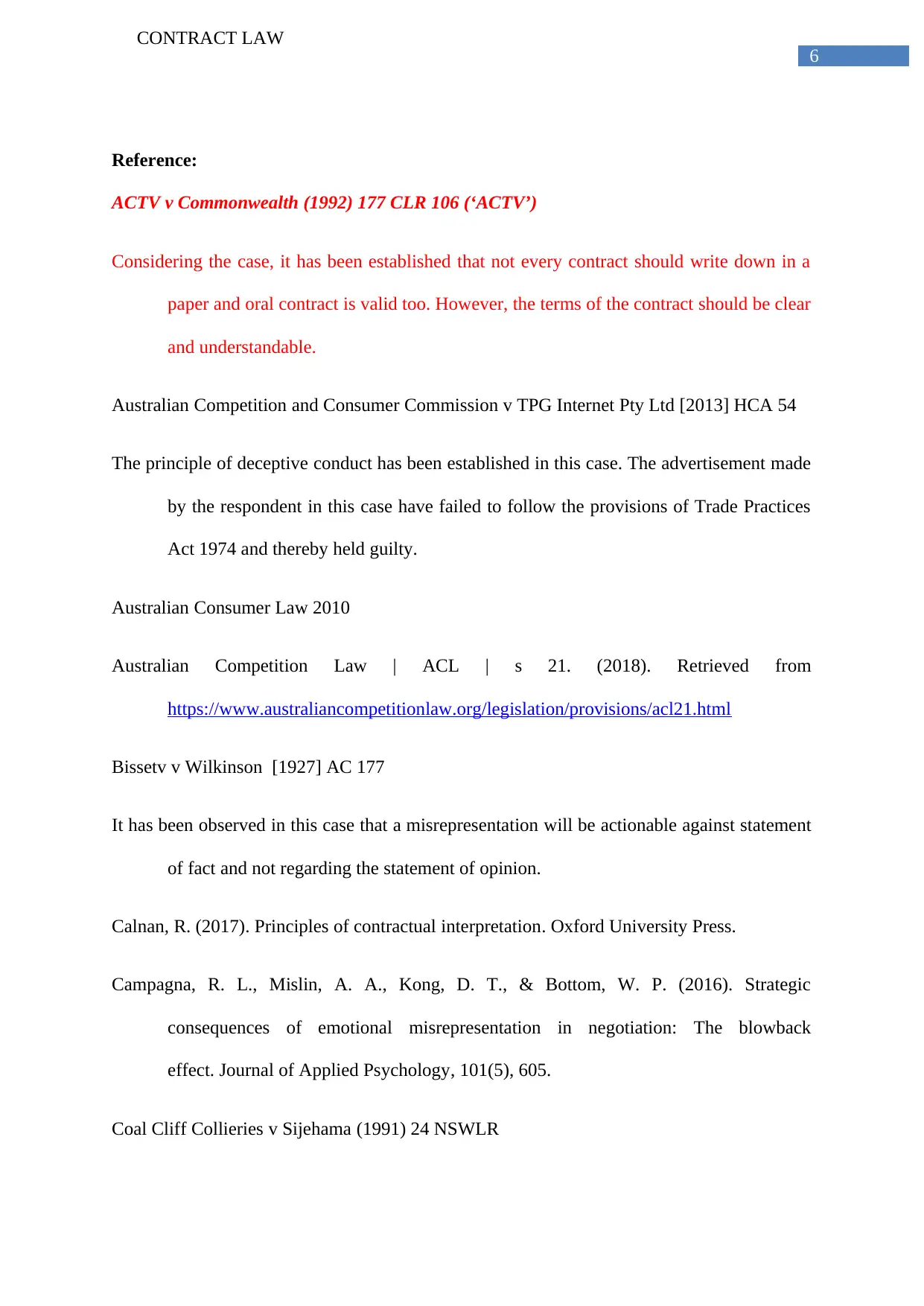
6
CONTRACT LAW
Reference:
ACTV v Commonwealth (1992) 177 CLR 106 (‘ACTV’)
Considering the case, it has been established that not every contract should write down in a
paper and oral contract is valid too. However, the terms of the contract should be clear
and understandable.
Australian Competition and Consumer Commission v TPG Internet Pty Ltd [2013] HCA 54
The principle of deceptive conduct has been established in this case. The advertisement made
by the respondent in this case have failed to follow the provisions of Trade Practices
Act 1974 and thereby held guilty.
Australian Consumer Law 2010
Australian Competition Law | ACL | s 21. (2018). Retrieved from
https://www.australiancompetitionlaw.org/legislation/provisions/acl21.html
Bissetv v Wilkinson [1927] AC 177
It has been observed in this case that a misrepresentation will be actionable against statement
of fact and not regarding the statement of opinion.
Calnan, R. (2017). Principles of contractual interpretation. Oxford University Press.
Campagna, R. L., Mislin, A. A., Kong, D. T., & Bottom, W. P. (2016). Strategic
consequences of emotional misrepresentation in negotiation: The blowback
effect. Journal of Applied Psychology, 101(5), 605.
Coal Cliff Collieries v Sijehama (1991) 24 NSWLR
CONTRACT LAW
Reference:
ACTV v Commonwealth (1992) 177 CLR 106 (‘ACTV’)
Considering the case, it has been established that not every contract should write down in a
paper and oral contract is valid too. However, the terms of the contract should be clear
and understandable.
Australian Competition and Consumer Commission v TPG Internet Pty Ltd [2013] HCA 54
The principle of deceptive conduct has been established in this case. The advertisement made
by the respondent in this case have failed to follow the provisions of Trade Practices
Act 1974 and thereby held guilty.
Australian Consumer Law 2010
Australian Competition Law | ACL | s 21. (2018). Retrieved from
https://www.australiancompetitionlaw.org/legislation/provisions/acl21.html
Bissetv v Wilkinson [1927] AC 177
It has been observed in this case that a misrepresentation will be actionable against statement
of fact and not regarding the statement of opinion.
Calnan, R. (2017). Principles of contractual interpretation. Oxford University Press.
Campagna, R. L., Mislin, A. A., Kong, D. T., & Bottom, W. P. (2016). Strategic
consequences of emotional misrepresentation in negotiation: The blowback
effect. Journal of Applied Psychology, 101(5), 605.
Coal Cliff Collieries v Sijehama (1991) 24 NSWLR
Paraphrase This Document
Need a fresh take? Get an instant paraphrase of this document with our AI Paraphraser
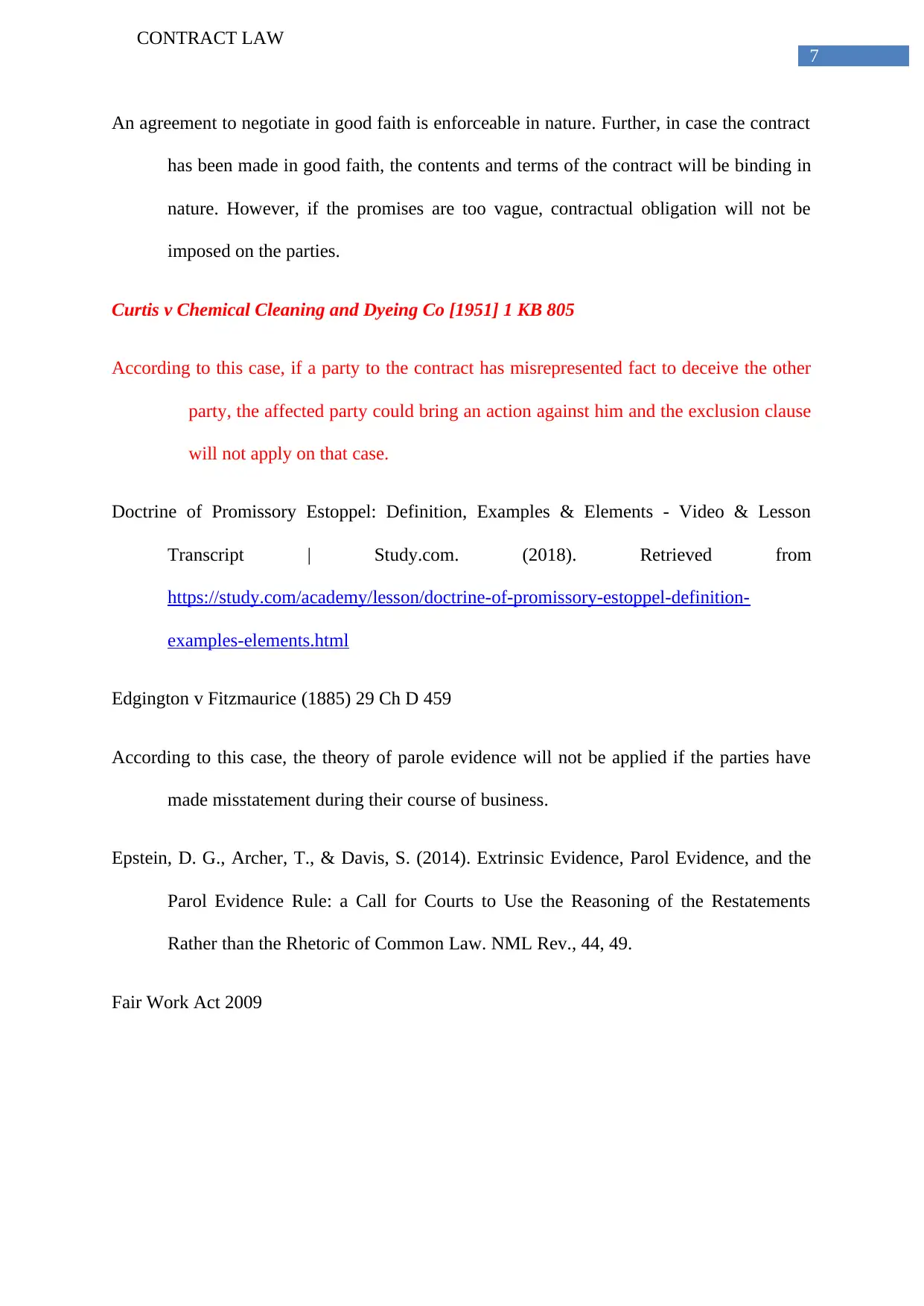
7
CONTRACT LAW
An agreement to negotiate in good faith is enforceable in nature. Further, in case the contract
has been made in good faith, the contents and terms of the contract will be binding in
nature. However, if the promises are too vague, contractual obligation will not be
imposed on the parties.
Curtis v Chemical Cleaning and Dyeing Co [1951] 1 KB 805
According to this case, if a party to the contract has misrepresented fact to deceive the other
party, the affected party could bring an action against him and the exclusion clause
will not apply on that case.
Doctrine of Promissory Estoppel: Definition, Examples & Elements - Video & Lesson
Transcript | Study.com. (2018). Retrieved from
https://study.com/academy/lesson/doctrine-of-promissory-estoppel-definition-
examples-elements.html
Edgington v Fitzmaurice (1885) 29 Ch D 459
According to this case, the theory of parole evidence will not be applied if the parties have
made misstatement during their course of business.
Epstein, D. G., Archer, T., & Davis, S. (2014). Extrinsic Evidence, Parol Evidence, and the
Parol Evidence Rule: a Call for Courts to Use the Reasoning of the Restatements
Rather than the Rhetoric of Common Law. NML Rev., 44, 49.
Fair Work Act 2009
CONTRACT LAW
An agreement to negotiate in good faith is enforceable in nature. Further, in case the contract
has been made in good faith, the contents and terms of the contract will be binding in
nature. However, if the promises are too vague, contractual obligation will not be
imposed on the parties.
Curtis v Chemical Cleaning and Dyeing Co [1951] 1 KB 805
According to this case, if a party to the contract has misrepresented fact to deceive the other
party, the affected party could bring an action against him and the exclusion clause
will not apply on that case.
Doctrine of Promissory Estoppel: Definition, Examples & Elements - Video & Lesson
Transcript | Study.com. (2018). Retrieved from
https://study.com/academy/lesson/doctrine-of-promissory-estoppel-definition-
examples-elements.html
Edgington v Fitzmaurice (1885) 29 Ch D 459
According to this case, the theory of parole evidence will not be applied if the parties have
made misstatement during their course of business.
Epstein, D. G., Archer, T., & Davis, S. (2014). Extrinsic Evidence, Parol Evidence, and the
Parol Evidence Rule: a Call for Courts to Use the Reasoning of the Restatements
Rather than the Rhetoric of Common Law. NML Rev., 44, 49.
Fair Work Act 2009
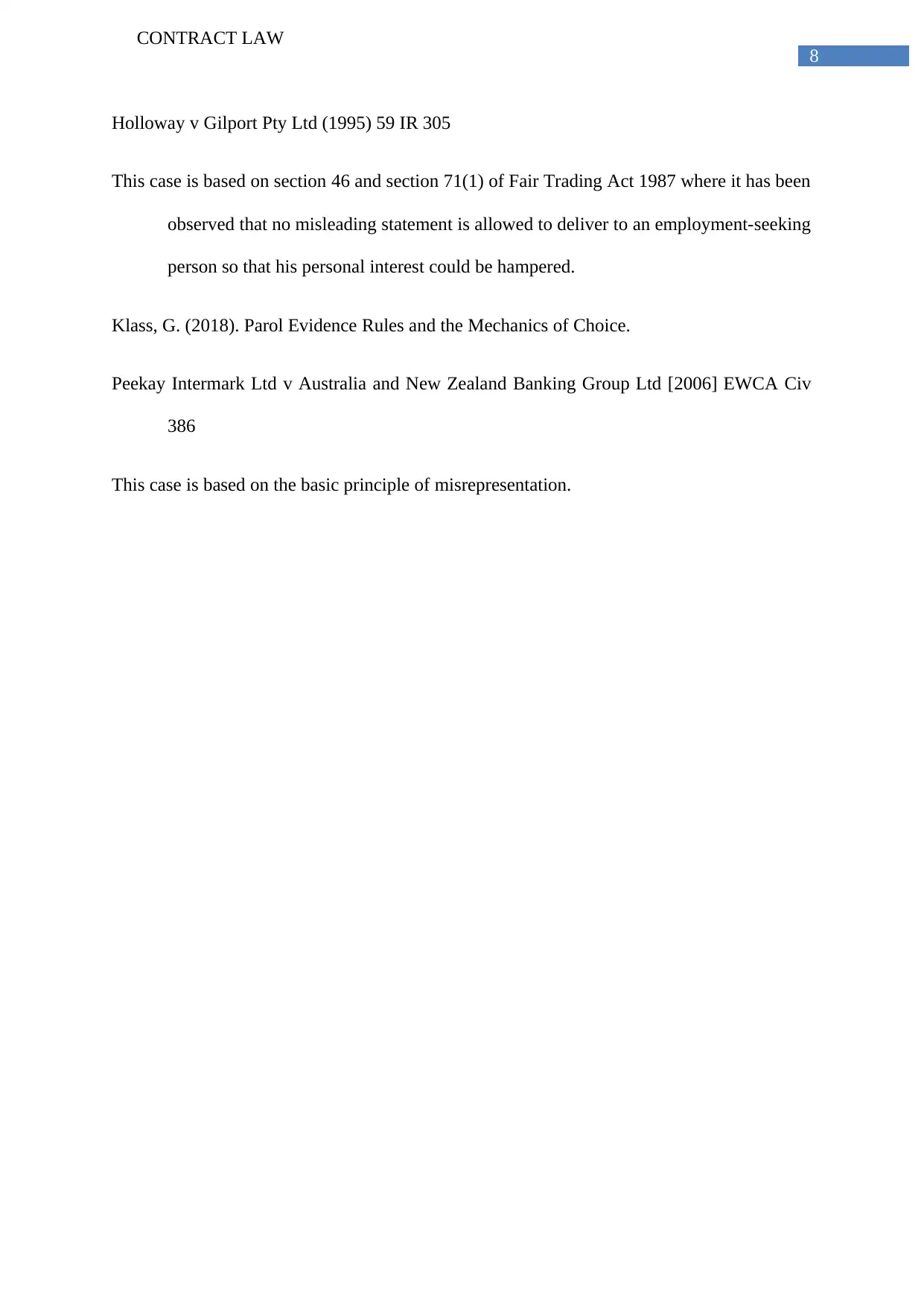
8
CONTRACT LAW
Holloway v Gilport Pty Ltd (1995) 59 IR 305
This case is based on section 46 and section 71(1) of Fair Trading Act 1987 where it has been
observed that no misleading statement is allowed to deliver to an employment-seeking
person so that his personal interest could be hampered.
Klass, G. (2018). Parol Evidence Rules and the Mechanics of Choice.
Peekay Intermark Ltd v Australia and New Zealand Banking Group Ltd [2006] EWCA Civ
386
This case is based on the basic principle of misrepresentation.
CONTRACT LAW
Holloway v Gilport Pty Ltd (1995) 59 IR 305
This case is based on section 46 and section 71(1) of Fair Trading Act 1987 where it has been
observed that no misleading statement is allowed to deliver to an employment-seeking
person so that his personal interest could be hampered.
Klass, G. (2018). Parol Evidence Rules and the Mechanics of Choice.
Peekay Intermark Ltd v Australia and New Zealand Banking Group Ltd [2006] EWCA Civ
386
This case is based on the basic principle of misrepresentation.
⊘ This is a preview!⊘
Do you want full access?
Subscribe today to unlock all pages.

Trusted by 1+ million students worldwide
1 out of 9
Related Documents
Your All-in-One AI-Powered Toolkit for Academic Success.
+13062052269
info@desklib.com
Available 24*7 on WhatsApp / Email
![[object Object]](/_next/static/media/star-bottom.7253800d.svg)
Unlock your academic potential
Copyright © 2020–2025 A2Z Services. All Rights Reserved. Developed and managed by ZUCOL.





